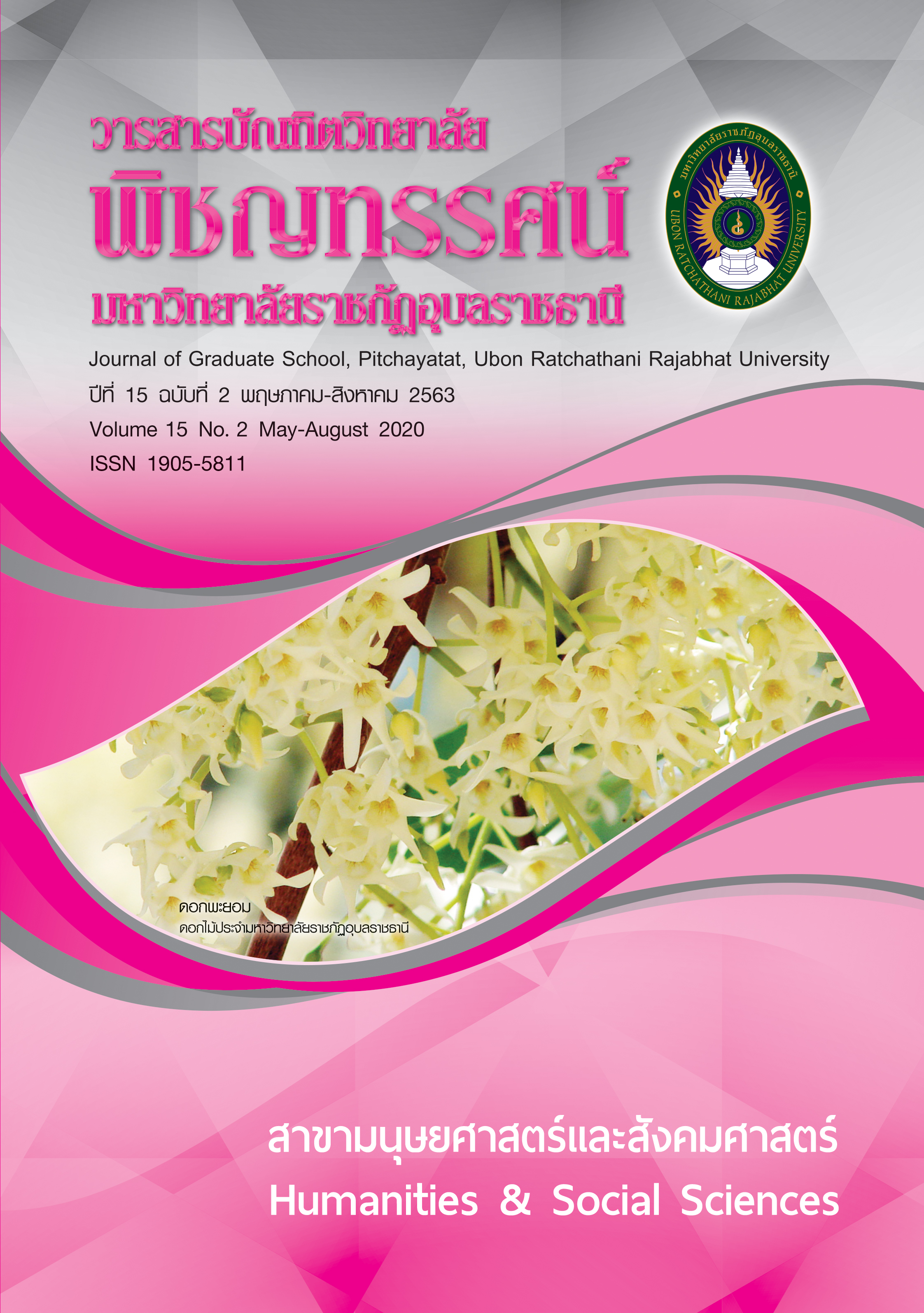หลักสูตรพัฒนาคุณภาพชีวิตผู้สูงอายุในทศวรรษหน้า
คำสำคัญ:
หลักสูตร, ผู้สูงอายุ, คุณภาพชีวิต, ทศวรรษหน้าบทคัดย่อ
การวิจัยครั้งนี้มีวัตถุประสงค์เพื่อ 1) ศึกษาสภาพปัจจุบัน ปัญหาและความต้องการในการพัฒนาคุณภาพผู้สูงอายุในทศวรรษหน้าตัวอย่างจำนวน 338 คน 2) พัฒนาหลักสูตรพัฒนาคุณภาพชีวิตผู้สูงอายุในทศวรรษหน้าตัวอย่างจำนวน 75 คน ได้มาโดยการเลือกแบบเจาะจง และ 3) ประเมินผลการใช้หลักสูตรตัวอย่างจำนวน 120 คน เครื่องมือได้แก่ แบบบันทึก แบบสัมภาษณ์ แบบสอบถาม แบบประเมินหลักสูตร แบบทดสอบ และแบบประเมินความพึงพอใจ สถิติที่ใช้ได้แก่ ค่าเฉลี่ย ส่วนเบี่ยงเบนมาตรฐาน และวิเคราะห์เนื้อหา
ผลการวิจัยพบว่า
- ผลการศึกษาสภาพปัจจุบัน ปัญหาและความต้องการในการพัฒนาคุณภาพผู้สูงอายุในทศวรรษหน้า
1) ผลการศึกษา สังเคราะห์เอกสารจากโรงเรียนผู้สูงอายุ พบว่า ด้านสุขภาพกาย มีการตรวจสุขภาพกาย ด้านสุขภาพจิต มีการคัดกรองภาวะซึมเศร้า ด้านสัมพันธภาพของผู้สูงอายุ เป็นต้นแบบจิตอาสาและเสริมสร้างสุขภาพ ด้านสิ่งแวดล้อมของผู้สูงอายุ มีความรู้สามารถนำไปเสริมสร้างในการอนุรักษ์และรักษาสิ่งแวดล้อม 2) ผลการศึกษาชมรมผู้สูงอายุที่มีวิธีปฏิบัติที่เป็นเลิศ พบว่าการส่งเสริมสุขภาพกาย มีการให้ความรู้เกี่ยวกับการดูแลสุขภาพกาย การส่งเสริมสุขภาพจิต ให้ความรู้เกี่ยวกับการรู้เท่าทันจิตใจตนเอง การส่งเสริมสัมพันธภาพทางสังคมของผู้สูงอายุ ให้ผู้สูงอายุเข้าร่วมกิจกรรมต่าง ๆ ภายในพื้นที่ และการพัฒนาสิ่งแวดล้อมของผู้สูงอายุ โดยการให้ความรู้ผู้สูงอายุในการดูแลผู้สูงอายุด้านสิ่งแวดล้อมที่บ้าน ปรับปรุงสิ่งแวดล้อมที่บ้านให้มีความปลอดภัย 3) ผลการสัมภาษณ์ประธานชมรมผู้สูงอายุ ตัวผู้สูงอายุ และลูกหลานผู้สูงอายุ พบว่า ผู้สูงอายุจึงมีความต้องการให้ตนเองมีสุขภายกายดี ด้านสุขภาพจิต ผู้สูงอายุวิตกกังวลกลัวว่าจะต้องพึ่งลูกหลาน ด้านสัมพันธภาพทางสังคม ผู้สูงอายุต้องการมีส่วนร่วมในการช่วยเหลือคนอื่น ด้านสิ่งแวดล้อมของผู้สูงอายุ ต้องการบ้านที่ใช้สอยได้สะดวก ปลอดภัย 4) ผลการสอบถามความคิดเห็นผู้เกี่ยวข้องกับผู้สูงอายุจากโรงพยาบาลส่งเสริมสุขภาพระดับตำบล และองค์กรปกครองส่วนท้องถิ่น พบว่า มีความต้องการในการพัฒนาหลักสูตรในระดับมาก และมีความต้องการให้จัดการเรียนการสอนเนื้อหาเกี่ยวกับการพัฒนาสุขภาพกาย พัฒนาสิ่งแวดล้อมของผู้สูงอายุ พัฒนาสัมพันธภาพทางสังคม และพัฒนาสุขภาพจิตในระดับมากที่สุด
- ผลการพัฒนาหลักสูตรพัฒนาคุณภาพชีวิตผู้สูงอายุในทศวรรษหน้า
2.2 ผลการประเมินหลักสูตรพัฒนาคุณภาพชีวิตผู้สูงอายุในทศวรรษหน้าโดยผู้เชี่ยวชาญ มีความเหมาะสม .94 ความเป็นไปได้ .93 มีความถูกต้อง .95 และความเป็นประโยชน์ .92
2.3 ผลการทดลองใช้หลักสูตรพัฒนาคุณภาพชีวิตผู้สูงอายุในทศวรรษหน้า พบว่า หลักสูตรพัฒนาคุณภาพชีวิตผู้สูงอายุในทศวรรษหน้าที่สร้างขึ้น มีประสิทธิภาพเฉลี่ย 84.41/85.67
- ผลการประเมินการใช้หลักสูตรพัฒนาคุณภาพชีวิตผู้สูงอายุในทศวรรษหน้า พบว่า คะแนนเฉลี่ยก่อนเรียนเท่ากับ 12.42 คะแนนเฉลี่ยหลังเรียนเท่ากับ 17.34 และเมื่อเปรียบเทียบคะแนนก่อนเรียนและหลังเรียนพบว่า มีความแตกต่างอย่างมีนัยสำคัญที่ระดับ .05 ค่าดัชนีประสิทธิผลของหลักสูตรมีค่าเท่ากับ .6490 ความพึงพอใจต่อหลักสูตรอยู่ ในระดับมากที่สุด
คำสำคัญ หลักสูตร ผู้สูงอายุ คุณภาพชีวิต ทศวรรษหน้า
เอกสารอ้างอิง
นนทรี สัจจาธรรม และคณะ.รูปแบบการดูแลสุขภาพผู้สูงอายุเพื่อพัฒนาคุณภาพชีวิต. “วารสารมนุษยศาสตร์และสังคมศาสตร์ มหาวิทยาลัยราชพฤกษ์,” 1, 1 (กุมภาพันธ์ – พฤษภาคม 2558): 43-54.
บังอร ธรรมศิริ. ผู้สูงอายุในสังคมไทย. การศึกษาค้นคว้าอิสระปริญญาคหกรรมศาสตรมหาบัณฑิต มหาวิทยาลัยสุโขทัยธรรมาธิราช, 2549.
มูลนิธิสถาบันวิจัยและพัฒนาผู้สูงอายุไทย (มส.ผส.) สถาบันวิจัยประชากรและสังคมมหาวิทยาลัยมหิดล.สถานการณ์ผู้สูงอายุไทย พ.ศ. 2558. กรุงเทพฯ: บริษัทอมรินทร์พริ้นติ้งแอนด์พับลิชชิ่ง จำกัด, 2559.
ยุพิน ทรัพย์แก้ว. การพัฒนาคุณภาพชีวิตผู้สูงอายุด้วยหลักสูตรโรงเรียนผู้สูงอายุของศูนย์ความเป็นเลิศด้านการสร้างเสริมสุขภาพผู้สูงอายุวิทยาลัยพยาบาลบรมราชชนนี นครศรีธรรมราช. “วารสารการพยาบาลและการศึกษา,” 9, 2 (เมษายน-มิถุนายน 2559): 25-39.
วิชัย วงษ์ใหญ่. การพัฒนาหลักสูตรระดับอุดมศึกษา. กรุงเทพฯ: อาร์ แอนด์ ปริ๊นต์, 2554.
ศศิพัฒน์ ยอดเพชร. การถอดบทเรียนตัวอย่างที่ดีของโรงเรียนและชมรมผู้สูงอายุ ที่มีกิจกรรมถ่ายทอดความรู้.กรุงเทพฯ: มูลนิธิสถาบันวิจัยและพัฒนาผู้สูงอายุไทย, 2560.
ศศิพัฒน์ ยอดเพชร . สวัสดิการผู้สูงอายุ : แนวคิดและวิธีการปฏิบัติงานสังคม สงเคราะห์. กรุงเทพฯ: มิสเตอร์ก๊อปปี้ (ประเทศไทย), 2549.
สามารถ ใจเตี้ย และดารารัตน์ จำเกิด. การพัฒนาแนวทางการสร้างเสริมสุขภาพผู้สูงอายุโดยฐานการมีส่วนร่วมของชุมชน. วารสารวิจัยราชภัฏเชียงใหม่ มหาวิทยาลัยราชภัฏเชียงใหม่. 15, 2 (เมษายน – กันยายน 2557): 37-45.
สุทธิพงศ์ บุญผดุง. การพัฒนาคุณภาพชีวิตผู้สูงอายุในท้องถิ่นโดยใช้โรงเรียนเป็นฐานตามหลักเศรษฐกิจพอเพียง (ระยะที่ 1). กรุงเทพฯ: มหาวิทยาลัยราชภัฏสวนสุนันทา, 2554.
อรวรรณ แผนคง สุนทรีย์ คำเพ็ง. ผลของการสร้างเสริมสุขภาพโดยใช้ชุมชนเป็นฐานต่อพฤติกรรมการสร้างเสริมสุขภาพของผู้สูงอายุและความพึงพอใจในการมีส่วนร่วมของผู้ดูแลผู้สูงอายุ. “วารสารรามาธิบดีพยาบาลสาร,” 16, 1 (2553): 1-13.
ดาวน์โหลด
เผยแพร่แล้ว
รูปแบบการอ้างอิง
ฉบับ
ประเภทบทความ
สัญญาอนุญาต
บทความทุกเรื่องได้รับการตรวจความถูกต้องทางวิชาการโดยผู้ทรงคุณวุฒิภายนอกอย่างน้อย 3 คน ความคิดเห็นในวารสารพิชญทรรศน์เป็นความคิดเห็นของผู้นิพนธ์มิใช่ความคิดเห็นของผู้จัดทำ จึงมิใช่ความรับผิดชอบของวารสารพิชญทรรศน์ และบทความในวารสารพิชญทรรศน์สงวนสิทธิ์ตามกฎหมายไทย การจะนำไปเผยแพร่ต้องได้รับอนุญาตเป็นลายลักษณ์อักษรจากกองบรรณาธิการ





